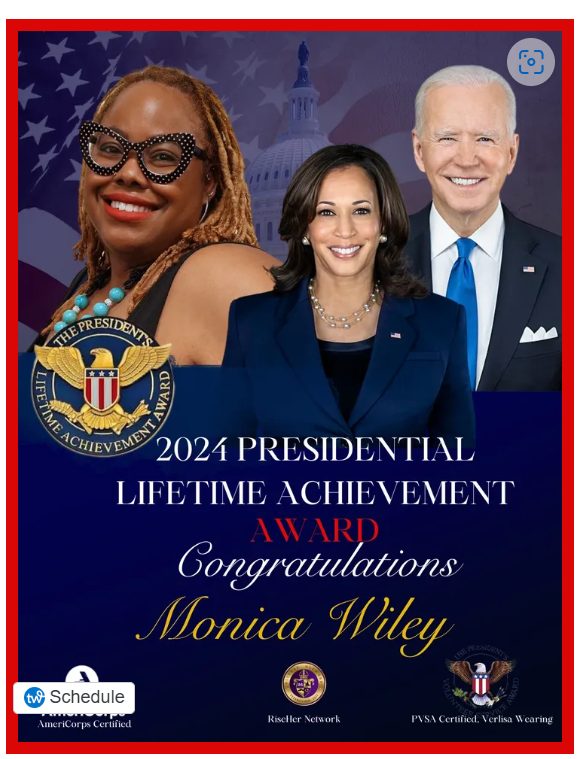Monica Wiley celebrates being honored for the Presidential Lifetime Achievement Award
by John Reid
Recently, the PW Perspective spoke with Monica Wiley about winning the Presidential Lifetime Achievement Award. Wiley, who has worked as a Disability Rights Advocate, is also the architect for the Election Law Curbside proposal for disabled individuals in Maryland.
She recalls how it began despite tragic circumstances. “On December 10, 1989, a drunk driver passed the tractor trailer my father was driving, with myself, my mom, and my sister in the vehicle. It hunched over the bridge and fell 150 feet through a power plant. We were buried a foot and a half underneath the trailer. My stepfather got ejected from the truck and the wire had cut his neck. My mother died instantly, and my back suffered trauma to the spine as it severed completely. I was paralyzed from the waist down, but even with all of that, God has bigger plans for me.”
Those plans were taking shape as she was confronted with a new reality.
“I knew I had a disability, but it was not going to define me. I had friends and family who were non-disabled who were supportive, and they provided a safe space for me. However, when I applied for jobs, no one would give me the opportunity to fulfill the responsibilities I knew I could do.”
“I started questioning my purpose and ask ‘Why am I here?'” “I was always a great debater, so I realized I could advocate through policy and engagement.”
“I went to a town hall meeting in Richmond,” she continued, “and I’m hearing these great speeches from candidates, but nothing pertaining to people with disabilities. So, I started questioning them on supporting the ADA…it was crickets. I knew then, I was in the right place for a time such as this. It was to strengthen the voice of disabled people in the political spectre.”
It opened doors for her work to reach the Oval Office.
“I applied for a job with the President Obama and [Vice President] Biden campaign as a regional outreach director, and I made sure they talked about how they were supporting the ADA,” she said. “We are integrated in the community, and we know the services we need, and to help them craft policies, because no one can speak for us better than we can.”
“From that point, I organized for people around the election, and they could be a part of the voting process.”
Curbside voting was one of her major accomplishments in the Commonwealth. “I made sure there were policies which allowed disabled voters to remain in their cars while voting when they pull up to the curb of a voting center. I’m proud to say curbside voting is now involved in every Virginia election, even women who are pregnant and are temporarily disabled.”
“It is truly rewarding to know that I was the architect in making that happen.”
Now she resides in Maryland, and her advocacy continues for curbside voting there. While she has received some support from the citizenry and even members in the House chambers, there are still ways to go to make it a reality.
“There has been some roadblocks in Maryland, but they’re not familiar with my bulldog style [laughs], but we will make it happen in the 2025 legislation.”
Besides that, Monica continues her work in the DEI space, especially in light of this critical election cycle. “This year, I have taken the DEI work I’ve experienced, and taken it into voting,” she said. “With race relations and equity, if your voter outreach program does not consist of DEI components, I don’t know what you’re working on. That is on the ballot. It is making sure we have the fairness to vote, and are included.”
“You cannot talk about DEI and not talk about disabilities,” she continued. “The founding principles of the ADA are based upon DEI. Brad Lomax of the Black Panther movement, Fannie Lou Hamer, they were also disabled, so when they were fighting for the Civil Rights legislation, they were also making sure disabled people had access into federal buildings. He led the 504 Sit-In protest of 1977 so they could push Section 504 of the Rehabilitation Act of 1973. That was the most important disability rights legislation in the country prior to 1990 passage of the ADA.”
They barricaded themselves in the building that day, but how did they get food, water, and the services they needed? “Brad Lomax led that charge. So, I just continue the work he started. I make sure I emphasize to elected officials on the assumptions, microaggressions, and biases that take place in engagement with disabled people. If you do not have DEI in your voter registration plan, what are you working on?”
The official ceremony will take place this Saturday in Atlanta.


